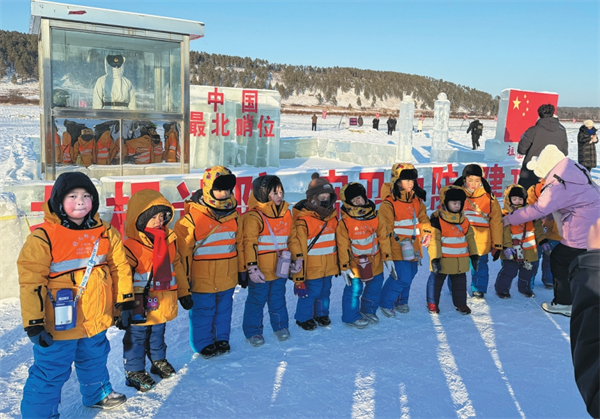Home>Civilization progress
Farmers rewarded for not burning crop stalks in field
Updated : 2014-12-10
By Zhou Huiying ( chinadaily.com.cn )
Cui Min, a 62-year-old farmer in the village of Lianhua, Bin county, Harbin, Heilongjiang province, recently finished harvesting his corn in much the same way he has for the past 40 years.
This year, however, after the harvest, he left the cut stalks standing in the fields instead of burning them.
"I signed a deal with a local company," Cui said. "They will pack the crop stalks and carry them away. In return for the crop stalks, they will also plow my fields before sowing in the spring."
The company, Heilongjiang Longneng Weiye Environment and Technology Shares, was set up in 2010. Its business mostly consists of recycling crop stalks from the countryside and household garbage from cities and towns.
"We invested 3 million yuan ($488,000) to buy five straw packing machines and have established a base for the collection, storage and transportation of crop stalks in Bin county," said Chen Linhua, assistant general manager of the company. "The crop stalks will be made into eco-fuel or used to produce electricity".
"The new model costs the company less for crop stalks, from 240 yuan per ton to 150 yuan. And the farmers also benefit from us plowing their fields for free," Chen said.
Since the second half of October, residents of Heilongjiang province have been continually plagued by heavy smog and haze, for which burning fields of crop stalks are considered a major source.
Authorities in the province started using unmanned aerial vehicles this year to monitor the burning of crop stalks.
According to the provincial government's plan to improve air quality, crop stalks are prohibited from being burned in cities and areas around airports and expressways.
"At the beginning of the harvest, the staff of the village committee were sent from house to house to explain the government policy and the harm caused by burning crop stalks," said Yang Zhaoguang, secretary of Lianhua.
"Longneng, the company, offers a new way for the villagers to deal with their crop stalks."
The village has 867 hectares of farmland used for corn, accounting for more than 80 percent of its cultivated land.
"More than 80 percent of the villagers have signed deals with Longneng. The rest will make their crop stalks into fuel for cooking and heating or fodder for their livestock," said Yang. "Therefore, burning of crop stalks has been basically eradicated in our village."
"The cost of plowing each hectare of a field is about 600 yuan for the hire of agricultural machinery, so every year I will save nearly 1,800 yuan," said Cui the farmer, who owns 2.7 hectares of land on which he grows corn.
"In addition, we can contribute to improving air quality," he said.
In addition to companies such as Heilongjiang Longneng, an alliance aimed at the comprehensive utilization of crop stalks was established in September in the province.
The alliance brought together companies, research and development institutions and colleges to explore making industrial oil from the stalks.
"Since the preparation phase, we have received lots of applications to join," said Wang Shuyang, president of the alliance. "We selected nine who have their advantages."
"We will set up a pilot site to benefit the farmers. It is expected that more than 20,000 tons of crop stalks will be made into more than 10,000 tons of industrial oil and 5,000 tons of biochar, with a sales profit of 20 million yuan," Wang said.
"We hope the crop stalks can be fully utilized without creating any pollution, and farmers can reap the highest returns."
"We hope that the alliance can promote the innovation, research and development of comprehensive utilization of crop stalks as well as accelerate the sustainable development of the economic cycle in rural areas," said Li Li, an official with the Heilongjiang Provincial Department of Science and Technology.

Harbin ramps up childcare services
A new comprehensive service center for childcare in Harbin is expected to be finished by the end of the year.
-
Talent policies drive enterprise development in Harbin
Harbin's "30 New Talent Policies" represents an iterative upgrade to the talent policy system, helping attract and retain talent to bolster economic and social development.
-
Official website of 2025 Asian Winter Games goes live
Harbin, the host city of the 9th Asian Winter Games, has announced that the official website for the 2025 event has recently gone live.
-
Harbin launches measures to facilitate more foreign trade
In the first three quarters of 2023, the total import and export value of Heilongjiang province's goods trade hit 218.22 billion yuan.





